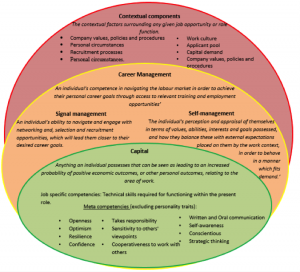What do we mean when we say international experiences develop graduates’ employability?
‘Employability’ is one of the most frequently used buzzwords in international education sector, and underpins a great proportion of the work educators do. But what does it actually mean, and how do we measure it? Stella Williams, a lecturer in psychology and researcher at Newman University Birmingham, has developed a framework to bring some clarity to an often hazily-defined concept.
The term ‘employability’ is often used as a throwaway line: jargon which is chucked into the mix to show the importance or relevance of something, frequently used without clarification of what we mean by it. So it is unsurprising that we can relate it to international experience. But what exactly do we mean when we say international opportunities develop a graduate’s employability?
Having explored existing definitions of employability, it’s clear that we’re referring to similar, but often different, issues. With the framework below I hope to clarify how these differing perspectives can provide a more holistic understanding of employability:

International experience as a developer of capital
At the core of this framework is an individual’s capacity. This is made up both of job specific competencies and what I have termed ‘meta-competencies’. Meta-competencies are those which are of importance not just to one job but to any job, through commonalities in employer expectations and the processes through which we seek employment. Here, we have the value of international experience for employability at the core of what people possess.
Research into international experience and graduate employability shows that links have already been made between these competencies and international experience. The i-graduate benchmark tool illustrates the impact of this experience on the development of resilience, interpersonal skills and confidence, as well as strategic thinking and collaboration skills. Crossman and Clarke, in discussing international experience and employability with students, employers and educators, in 2010 identified connections in the form of ‘soft skills’ such as empathy, open mindedness and respect. And they also identified links between international experience and employability in the form of being able to ‘take on responsibility’, which again has been incorporated into this framework’s understanding of employability.
Links between international experience and employability in the form of being able to ‘take on responsibility’, have been incorporated into this framework
Whilst this presents a strong case for correlation between international experience and employability, employability goes beyond a discussion of these core competencies. Capital needs to be moulded to meet the needs of the individual and context.
International experience as a developer of self-management
Career management can broadly be divided into two parts. Firstly, self-management: the ability to perceive and appraise oneself effectively – in terms of values, abilities, interests and goals – and how they balance with the external expectations of the work context. International experience not only offers insights into the expectations of different cultures, but has also been linked to self-discovery. Thus, this experience can heighten one’s self-awareness.
Furthermore, employability from this perspective compares the understanding of one’s self, to contextual expectations. International experience offers insights into the expectations of other cultures, offering development of cultural and global awareness. Once again, this offers a solid case for the value of cross-cultural experience in increasing an individual’s employability.
“International experience offers insights into the expectations of other cultures, offering development of cultural and global awareness”
International experience as a developer of signal management
Alongside this self-management is signal management – an individual’s ability to navigate and engage with networking and selection and recruitment opportunities. If we return to the competencies making up the capital dimension of this framework – our first dimension of employability – individuals will already have some of these competencies, which were the initial drivers for engaging in international opportunities. In this context it is not the core capital of the individual which is being developed, but rather the signalling opportunities. By engaging in international placements the student can signal that they have these competencies and expand their bank of relevant examples that will help them demonstrate the job specific and meta-competencies employers seek.
Presentation skills and commercial awareness are important competencies linked to this signal management. While developed by international experience, educators have noted that the ability to package international experience for employers is as an area of weakness for many students; and whilst international experience has been linked to networking opportunities, these links need to be nurtured.
In order to fully benefit from international experience, students must understand how this experience will benefit their engagement with the world of work, maintain the skills derived and take steps to communicate them to potential employers.
“In order to fully benefit from international experience, students must understand how this experience will benefit their engagement with the world of work and take steps to signal them to potential employers”
Employability Context
Finally, external to the individual is the employability context: the demand for skills, personal circumstances, company values etc. Work culture is part of this – not just the cultures of specific companies, or branches within these companies, but also culture that exists beyond the confines of the workplace, including the location in which someone works.
Whether these are aspects that can be changed goes beyond the scope of this entry. Furthermore, the effects of a fourth industrial revolution on capital demand, and on working practice, has yet to be seen. This context is certainly not something an individual can alter, but a dimension that they must work with.
Considering this employability framework, it’s clear that international opportunities are an important means of developing employability. If there’s a lack of clarity around the meaning of ’employability’ which challenges students’ ability to market their international experience then hopefully this has shed some light on some of the reasons, perhaps drawn to light some areas for further attention. In order to make the most of these experiences, the dimension of signal management cannot be overlooked.
Leave a Reply